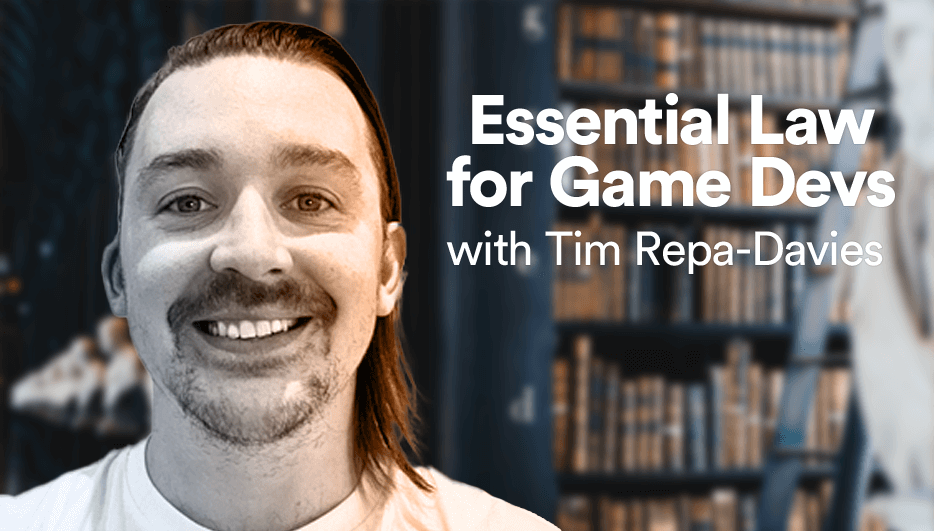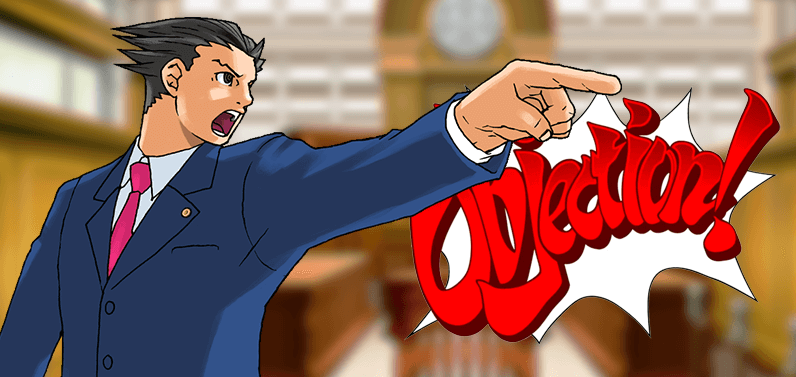Essential Law for Game Devs: Introducing Tim Repa-Davies

When aspiring game developers first start to dream of a career crafting video games, they likely imagine days spent building engrossing worlds, shaping assets in art tools, or coding innovative new mechanics.
Video game law? That’s something that probably doesn’t come to mind quite so much. And if it does, it perhaps isn’t seen as particularly exciting or relevant to the creative side of making games. After all, law is just an admin function unrelated to the process of actually making games, right?

Well… not quite.
In fact, a fundamental familiarity with the laws that are most relevant to game development and publishing can empower teams and individuals to do better work - by establishing a professional working environment, letting employees feel empowered, and making sure the world’s you build are protected. And not just that – it can also help your games reach more players, while letting you build a thriving studio – which in turn affords the opportunity to create yet more amazing titles in the future.
Approaching and embracing a legal system that can feel so complex and bewildering is understandably intimidating. However, when you consider legal alongside a context you understand and adore – like making games – you’ll likely find it is a great deal more logical and engaging than you may have assumed.
Moreover, the games industry now includes a great many legal professionals wholly or mostly devoted to games. They work helping developers protect the creations they have worked on, understand contracts and agreements with publishers and other partners, and set up and maintain lasting businesses. Whatever your experience actually designing and making games, if you plan to found a studio or develop a new intellectual property (such as a new game) bringing in the insight and expertise of a game and entertainment lawyer is effectively essential.
Legal Matters
Over time, here at LootLocker we’ve gained tremendous insight from game-focused lawyer Tim Repa-Davies. And we’re delighted to say Tim will now be sharing his expertise on this very blog, meaning the entire LootLocker community can learn from one of the best there is.
A game development and publishing lawyer who stands as a partner at legal firm Sheridans, Tim has helped numerous studios and creative teams over the years, including Splash Damage, Secret Mode, and DreamWorks Animation. He’s also worked as advisor to the board at numerous indie teams, such as Brave at Night, Kaizen Game Works, Stave Studios, and Tributary Games.
Tim’s particular specialties are video game intellectual property (IP), and the commercial and financial elements of running a game business.
And he’s also a passionate gamer with a long established love of RPGs and narrative-led games. We admire and respect Tim as an incredible fountain of knowledge for perspectives of game law – but he also has a lot of infectious passion when it comes to Suikoden I and Suikoden II or Persona 4 Golden. And he still hasn’t quite got over his devotion to Stardew Valley.
That’s not just a nice extra detail. It’s important. Understanding games from the player perspective is as key to game law as it is to game dev.
In the coming weeks and months you’ll be hearing more from Tim here, as he shares his fascinating, deeply helpful perspectives, informed by his nine years as a game lawyer. But to get us started, we asked him what he felt game makers should first consider when it comes to embracing the world of game-related legal matters.
Getting Started with Game Law
“The first thing I always tell devs is to make sure they have contracts in place with everyone who works on their game - even if you are good friends with the person who is helping you out,” Tim offers, touching on a fundamentally important matter. “ A proper contractor agreement or employment agreement gives the dev clear evidence of the ‘chain of title’ to the intellectual property rights (IPRs) in their game – which is important if you are looking to raise money or sign with a publisher. It also helps both sides understand the commercial terms - for example payment, deadlines and so on – of their professional relationship so that both developer and contractor are on the same page.”
Those kind of contracts might not sound particularly exciting. In truth, ‘exciting’ isnt the word. But they sure are important. Beyond letting you secure the future of your business while respecting the wellbeing and talent of the people that help make your titles, they ensure that if one of your games does triumph and spawn sequels, merch and maybe even that Netflix spin off, everybody knows where they stand.

“Copyright is the most important form of IP when we talk about IPRs in the context of developing and publishing games,” Tim continues. “Most developers do not know that the first rule of copyright ownership in most territories around the world is as follows: ‘the creator is the first owner of the copyright in the work that they create’.
“Without a clear contract that assigns the copyright (and other IPRs) in that work to the developer then the copyright will remain the property of the contractor who made it. This is the case even if you have paid the contractor to create that work. This can be a problem when individuals fall out, or if a project becomes successful or receives funding - money really can change things. So, having a clear contract at the outset keeps things aligned, and can save a lot of heartache down the line.”
To a degree, that simply means you can stay focused on making great games in a studio that values the talent and worth of its people.
“Not only that,” Tim adds, “if you sign with a publisher, or take investment, then a requirement of receiving those development funds or investment will be for the developer to promise to the publisher and-or investor (legally this is referred to as a ‘warranty’) that they own all of the IPRs in the game that they are making. If you don’t have contracts in place with your staff or contractors then you cannot give this promise or, if you do, you will be liable to repay all of the funds or investment back to the publisher / investor should things blow up.”
Case Closed?
Those fundamentals Tim has highlighted really are what law is all about. It protects people and the things they make, while trying to avoid drama in the future that may undermine a company or the success of its games. If you want to learn more from Tim already, you can check out his guides to understanding game IP rights and IP ownership. They’re absolutely worthwhile reads. You can also follow Tim on Twitter and tweet him any legal questions you might have.
There’s so many other ways that legal frameworks can inform and empower game dev, of course. Which is why we look forward to sharing more of Tim’s insights going forward. You can be sure he’ll have more detailed guides to share around IP, and advice for founders setting up and running game studios.
In between a few visits to check on how his vegetables are doing in Stardew Valley, of course.